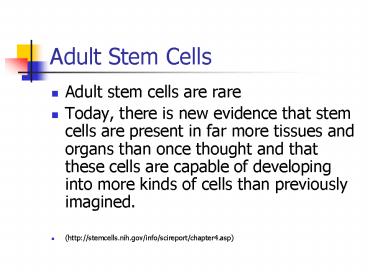Adult Stem Cells PowerPoint PPT Presentation
1 / 13
Title: Adult Stem Cells
1
Adult Stem Cells
- Adult stem cells are rare
- Today, there is new evidence that stem cells are
present in far more tissues and organs than once
thought and that these cells are capable of
developing into more kinds of cells than
previously imagined. - (http//stemcells.nih.gov/info/scireport/chapter4.
asp)
2
Adult Stem Cells
- In fact, no one knows the origin of adult stem
cells in any mature tissue. Some have proposed
that stem cells are somehow set aside during
fetal development and restrained from
differentiating. - (http//stemcells.nih.gov/info/scireport/chapter4.
asp)
3
Adult Stem Cells
- Definitions of adult stem cells vary in the
scientific literature range from a simple
description of the cells to a rigorous set of
experimental criteria that must be met before
characterizing a particular cell as an adult stem
cell. Most of the information about adult stem
cells comes from studies of mice. - (http//stemcells.nih.gov/info/scireport/chapter4.
asp
4
Adult Stem Cells
- The list of adult tissues reported to contain
stem cells is growing and includes bone marrow,
peripheral blood, brain, spinal cord, dental
pulp, blood vessels, skeletal muscle, epithelia
of the skin and digestive system, cornea, retina,
liver, and pancreas. - (http//stemcells.nih.gov/info/scireport/chapter4.
asp)
5
Adult Stem Cells
- However, more work is needed to determine if they
are true stem cells or are progenitor cells - (http//stemcells.nih.gov/info/scireport/chapter4.
asp)
6
Cardiac Stem Cells?
- Scientists in Feb. 2005 announced in journal
Nature the discovery of progenitor cells ,
similar to stem cells, in the mouse, rat and
human heart that can divide in vitro and can
differentiate into contracting cardiac cells. - (Boston Globe, Feb. 10, 2005)
7
Cardiac Stem Cells?
- The article stated that there were probably too
few of the cells in a heart to be a natural
repair mechanism.
8
Skeletal Muscle Stem Cells
- Skeletal muscle is derived from embryonic
mesoderm. - To date, at least three populations of skeletal
muscle stem cells have been identified satellite
cells, cells in the wall of the dorsal aorta, and
so-called "side population" cells. - Satellite cells mediate muscle growth
9
Adult Stem Cell Plasticity
- It was not until recently that anyone seriously
considered the possibility that stem cells in
adult tissues could generate the specialized cell
types of another type of tissue from which they
normally resideeither a tissue derived from the
same embryonic germ layer or from a different
germ layer - (http//stemcells.nih.gov/info/scireport/chapter4.
asp)
10
Adult Stem Cell Plasticity
- For example, studies have shown that blood stem
cells (derived from mesoderm) may be able to
generate both skeletal muscle (also derived from
mesoderm) and neurons (derived from ectoderm). - (http//stemcells.nih.gov/info/scireport/chapter4.
asp)
11
(No Transcript)
12
Can any adult cell be induced to revert to being
a stem cell?
- Recent research with Drosophila (the fruit fly)
in the lab has accomplished this
(www.hhmi.org/news/spradling2.html)
13
Potential Uses of Stem Cells
- Already used to treat certain diseases
- Provide information about and treatments for
genetic diseases - Provide information about and treatments for
cancers - Treat diseases in which normal cells become
defective e.g. neurons in Parkinsons disease

